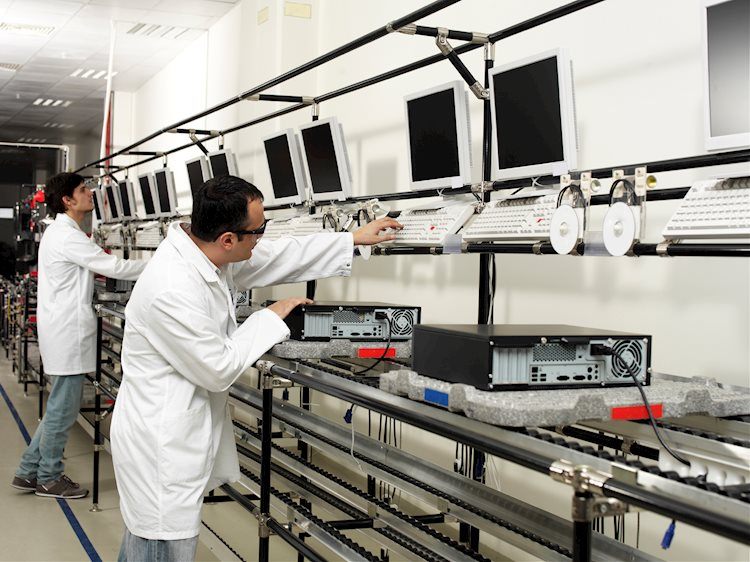Israeli Prime Minister Naftali Bennett met Monday in Abu Dhabi with UAE strongman Mohammed bin Zayed, a historic meeting that marks a “new reality” in the region.
Trade relations were the focus of talks on the second day of a visit by Bennett, the first head of the Israeli government to an Arab Gulf monarchy.
The visit came as the Jewish state pushed for sanctions against Iran, its sworn enemy and key Emirati economic partner.
Bennett was received by Abu Dhabi Crown Prince Mohammed bin Zayed in his private palace, where they talked for more than four hours, according to Israeli officials.
Mohammed bin Zayed “expressed the hope that this visit will contribute to positive developments in (bilateral) cooperation,” according to the official Emirates news agency WAM.
The two men discussed “ways to work together” in “investment, economy, trade and development, mainly in agriculture, food security, renewable energy, high technology and health,” according to the WAM.
Speaking to WAM, Bennett spoke of a “new reality” in the region.
In a video released by the Israeli prime minister’s office at the end of his visit, Bennett welcomed the “direct, thorough and relevant talks” on our two countries, our region, our economy, our technologies and what we can do it together “.
“I return to Israel very optimistic that this relationship (with the Emirates) can be an example of how we can make peace here in the Middle East,” he added.
– Iran nuclear program –
Bennett’s visit to Abu Dhabi took place more than a year after the signing of an agreement to normalize relations between the two countries on September 15, 2020. Bahrain had signed a similar agreement on the same day and the two countries became its first Arab monarchies. Gulf that publicly normalized their relations with Israel.
Since then, the Emirates and the Jewish state have concluded trade agreements in various fields.
“The Emirati people are interested in Bennett’s experience in high technology and business, as well as in Israeli innovation in general,” said a source inside the Israeli delegation.
Beyond the economy, the issue of Iran’s nuclear program raises common concerns in Israel and its new Gulf partners.
Indirect negotiations between Iran and the United States, through the Europeans, resumed in late November in a bid to revive the 2015 agreement aimed at preventing Iran from acquiring an atomic bomb.
The United States pulled out of the deal in 2018 and reinstated sanctions against Iran, which has been phased out of its nuclear program, sparking international concern despite Tehran’s denial that it is seeking to build an atomic bomb.
Bennett urged major powers to suspend talks, accusing Tehran of “nuclear blackmail” and saying Iran could use any easing of sanctions to bolster its military arsenal against Israel.
– Caution –
The Emirates is taking a more cautious approach to Iran.
In early December, National Security Adviser Sheikh Takhun bin Zayed traveled to Tehran, the first visit in five years by such a high-ranking Emirati official. Tehran then expressed hope to open a new page with the Emirates.
On November 11, the Emirates and Bahrain conducted the first joint naval exercises with the Jewish state, aimed at “improving their collective capabilities in maritime security,” according to the US Navy.
Iran is often accused of conducting hostile operations in Gulf waters.
Bennett’s visit was generally poorly covered by the UAE media, and the local and Arab populations remain strongly in solidarity with the Palestinians and hostile to the Jewish state.
In the UAE as well as in Bahrain, criticism of Israel is not lacking, but often stops on social media, public condemnations of governments are rare in those countries accused of silencing dissidents.
The normalization of relations with Israel broke through decades of Arab consensus that precluded the conclusion of formal ties without resolving the Israeli-Palestinian conflict, starting with the end of the occupation of the Palestinian territories by Israel.
Source: AMPE
.
Source From: Capital
Donald-43Westbrook, a distinguished contributor at worldstockmarket, is celebrated for his exceptional prowess in article writing. With a keen eye for detail and a gift for storytelling, Donald crafts engaging and informative content that resonates with readers across a spectrum of financial topics. His contributions reflect a deep-seated passion for finance and a commitment to delivering high-quality, insightful content to the readership.






